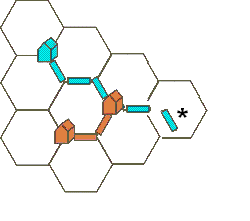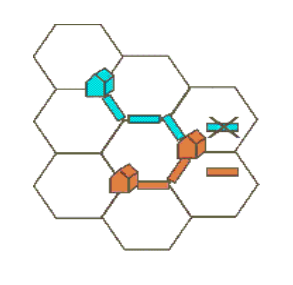
Yes. This is not contradicted by the rules.
While there is a recommended starting set-up for players who are new to the Base Game, in the Base Game extension this is not the case. Therefore, each player receives the resources that correspond to the starting settlement he placed last.
No. This only applies when a “7” is rolled.
As many as you can pay for. You may play only one Development Card per turn, but not during the same turn you bought it.
Yes.
Yes. Note that you may play only one Development Card per turn: if you have played this card before rolling the dice, you are not allowed to play another one afterwards.
Place your played Knight cards face up in front of you.
Place your Invention, Monopoly, and Road Building cards on a discard pile to remove them from the game.
Yes.
Yes.
You place it face up in front of you. You’d like to eventually have the Largest Army, wouldn’t you?
No. In the game instructions it is assumed that players are honest.
Yes. However, players are not compelled to provide correct information on the resources they have.
No. You may play Development Cards at any time during your turn, also in the middle of your trade phase.
No. You may play Development Cards only on your own turn. The special building phase is not part of your turn.
No. If, on your turn, you have reached the victory points (including your Victory Point Cards) required to win, you may reveal all your Victory Point Cards at once.
No. You can only win during your own turn.
Place the harbors adjacent to terrain hexes so that both harbor locations border on land.
No. This rule is a guideline of how to proceed if you play the game for the first time. Experienced players will most likely choose some other way of determining the starting player.
The rules do not prohibit it. However, common sense should tell you to play in such a way that your current opponents will also want to play with you tomorrow.
Yes. That’s how it’s specified in the game rules.
No. A Knight Card that hasn’t been revealed is like a lottery slip where you marked six winning numbers but then didn’t submit it to enter the drawing: it’s useless!
In principle, yes; but on Catan the circle is a hexagon. When counting the individual road pieces, it doesn’t matter whether or not they are built in a more or less straight line - what matters is that they establish an uninterrupted connection between two intersections. This is why six road pieces connected in a hexagonal fashion still count as six road pieces.
No.
By building a settlement on an intersection of the Longest Road. Needless to say that you must observe all building rules when doing this.
If your continuous road was interrupted by a settlement, you might be able to build a “bypass”: a detour around one or more hexes.
Yes. You can add individual road pieces as long as you have a road, settlement or city to connect them to.
The card stays with its current owner.
Here we have to distinguish between three cases:
The Longest Road is a continuous road connecting two intersections, which consists of at least five individual road pieces and is not interrupted by game pieces belonging to other players. It has more individual road pieces than any other connecting road of this type.
No.
Yes.
Yes.
No. In this case, he receives all available Resource Cards of this type.
If it isn't sure whether there will be enough cards of a certain type for all players, first determine the total number of available cards of this type. If the number of cards of this type is indeed insufficient, then none of the players receives this resource on this turn.
Please consider also this question:
Yes.
Yes, immediately after a production roll, before distributing the resources - but only if it isn't sure whether there will be enough cards for all players entitled to receive them.
Please look at these questions:
You may build as many roads as you can pay for.
A continuous road is considered closed if it connects two of your settlements and/or cities with each other or if it connects one of your settlements or cities with one of your units (knights). You are not allowed to remove a road segment from a closed road. This rule does not apply if the roads only connect one settlement/city with itself, thus forming a circle. The same rule applies for ships.
Please read here for more information on this topic with examples: When is a ship "open"?
Yes, if you add the new road piece to one of your own roads. The blue player may build the road piece marked with "*", even though his continuous road is interrupted by the red settlement.

No. If you build a new road, it must always connect to one of your own roads, settlements, or cities.

In the situation depicted above, the blue player would not be connecting his road piece to his own road but to the red player's settlement, which the rule prohibits. Therefore, only the red player may continue to build behind the red settlement.
No.
No.
No.
It’s not possible. Catan is not a cruise ship, where you reserve a deck chair by placing your towel on it.
No.
Yes. You may do so as long as you have an own road adjacent to which you can build.
Yes. This is not contradicted by the rules.
Yes. Your own settlement does not interrupt your continuous road.
Yes. According to Catan’s building law, each point where three hexes meet is an intersection.
No.
No. This is only possible during the set-up phase. Afterwards, each settlement must connect to at least one of your own roads, and each road must connect to one of your own settlements/cities or roads.
It says that at any time during the game, each settlement and each city must be surrounded by three intersections that neither are occupied by one’s own nor by another player’s settlement or city.
Yes.
You must place the robber on a different hex.
No.
If you move the robber to the desert because you rolled a “7” or played a Knight Card: yes.
Traders & Barbarians features some other possibilities to move the robber to the desert. In this context, please note the different rules for this game.
Yes.
Yes.
Yes. Playing a Development Card is independent from the dice roll result.
No.
No.
Bad luck: You won’t be able to draw a card from this player.
Yes.
No.
Yes they can. The robber only prevents that hex from generating (when its number is rolled). Similarly, the other hexes of the same type will still generate that resource (even if they are the same number as the hex being blocked by the robber).
No. Not only is a triangular trade forbidden, it is also unnecessary, because player B and player C each trades individually with player A and, thus, may trade whatever resource he has – provided that it meets the requirements of player A.
No. On Catan, a trade always involves giving and taking resources. Consequently, Catan’s trade law does not contain a “trade” of something for nothing or for immaterial goods such as services.
No.
No. You only have the possibility to trade with the owner of the harbor himself, maybe by offering him something that he, in turn, could trade via his harbor.
No.
The special harbor hexes always depict the resource type of which you have to pay two in order to either receive one different resource or one commodity.
No. You can only win during your own turn.
No.
This could make sense in a private tournament where the scores from several games are added up. For individual games and official tournaments, the following applies: You have won as soon as you have reached the required number of victory points on your turn – and then the game is over.
Yes. The game ends as soon as a player has reached the required number of victory points on his turn. If he’s unaware of it, you should tell him, because you can’t take an already gained victory away from him.